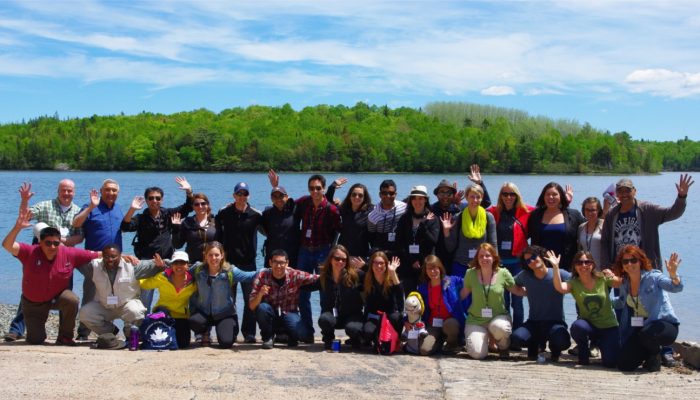Saskia Keesstra E-mail: saskia.keesstra@wur.nl Deputy President of the Soil System Sciences Division of the European Geosciences Union Why connecting connectivity research? Successful prediction of pathways of storm runoff generation and associated soil erosion is of considerable societal importance, including off-site impacts such as water quality and the provision of related ecosystem services. ...[Read More]
If you didn't find what you was looking for try searching again.
Geology for Global Development
Friday Photo (126) – Nyoma Residential School (Ladakh)
GfGD, IERT (University of Jammu), and Teachers/Students from Nyoma Residential School A post-teaching photograph in the heart of the Indian Himalayas, with the Indus River in the background. Students had recently undertaken a one-day course on glaciers and climate change, landslides and earthquakes. Read more about the project in a collection of posts with this tag. Credit: Geology for Global Deve ...[Read More]
WaterUnderground
The home of our hearts, Cape Breton – A transformative professional experience with the Canadian Water Network (Part 1 of 6: prologue)
Prologue [part one of a special six-part blog series by Mark Ranjram, MEng student at McGill University. From June 8 to June 13 2014, Mark had the privilege of being a part of the Canadian Water Network’s (CWN) Student and Young Professionals (SYP) Workshop in Cape Breton Island, Nova Scotia] Let me start this series off by expressing how life changing this event was for me. I am very much a techn ...[Read More]
Geology for Global Development
GfGD in the Himalaya (6) – Student Posters
As part of the geology education programme, run in Leh on 20-21st June, students were invited to produce a poster reflecting one of the core themes of the event (energy, natural resources, climate change, geohazards and disasters). The topics of climate change global warming were the most popular selected by students. Here is a small sample of some of those produced:
Between a Rock and a Hard Place
Science Snap (#26): Angel Falls, Venezuela
Sorcha McMahon is a third year PhD student in the School of Earth Sciences at the University of Bristol. Sorcha is investigating how strange igneous rocks called carbonatites may have formed, using both natural samples and high-pressure experiments. Angel Falls is the world’s highest uninterrupted waterfall in the Canaima National Park, a UNESCO World Heritage site in the Gran Sabana region of Bol ...[Read More]
Between a Rock and a Hard Place
Alumnus profile #6 – Dr Susan Little
The latest in our mini-series chronicling the after-(PhD)-lives of University of Bristol Earth Science alumni… Dr Susan Little Post-doctoral researcher, ETH Zürich PhD title “‘The Oceanic Biogeochemical Cycling of Cu and Zn and their Isotopes’”
Geology for Global Development
Friday Photo (116) – Eruption at Santiaguito (Guatemala)
Eruption at Santiaguito Volcano (Guatemala) on Tuesday 18th February 2014, taken from the top of Santa Maria (Credit: Joel Gill)
Between a Rock and a Hard Place
Science Snap (#16): Primary colours at Kawah Ijen
Mel Auker is an Earth Sciences PhD student in the School of Earth Sciences at the University of Bristol. A mathematician by trade, Mel’s PhD uses numerical approaches to better understand past, present, and future global volcanic hazard and risk. Kawah Ijen volcano forms part of the Ijen volcano complex situated at the eastern end of Java, Indonesia. Kawah Ijen is topped by a 1 kilometre-wid ...[Read More]
Seismology
Old and new composite pictures of San Francisco highlighting the impact of the 1906 earthquake
Old and new composite pictures of San Francisco highlighting the impact of the 1906 earthquake How would San Francisco look like if a similar 1906 earthquake had to strike again? Despite the many predictions and models, this is a good hint to help our imagination. Check the photos here: http://pixtale.net/2012/09/composite-then-and-now-photos-of-the-1906-san-francisco-earthquake/
Geology for Global Development
Placement Reminder – Deadline Midday Friday 6th December
A reminder about our exciting placement opportunities – deadline this Friday (6th December) at midday. GfGD PLACEMENT OPPORTUNITY The information below can be downloaded as a PDF WHEN & WHERE: Approximately 1-2 weeks (per topic) during December to early January (student’s Christmas vacation). Precise working dates are flexible. To minimise costs to the student and enable students to have ...[Read More]

